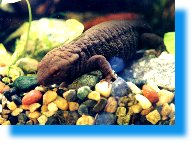![]()
![]()
![]()
![]()
![]()
![]()
![]()
![]()
![]()
![]()
![]()
![]()
Hey - do you like jewelry, handbound books, baskets or other neat gifts & plain old fun stuff?
Then take a moment to help feed our fish and check out our items on eBay
Just click on the image below. Thanks!
![]()
Please take a moment
to visit another of our
sponsors:



On this page you will find information on the amphibians living in our aquariums. We've listed them all alphabetically by their common names. The thumbnail images all link to larger pics.

 African
Dwarf Frog - Hymenochirus Curtipes
African
Dwarf Frog - Hymenochirus Curtipes
- Origin
- Africa (seems obvios, doesn't it)
- Habitat
- Calm water, totally aquatic.
- Size
- About 1 1/2 inches total length.
- Temperature
- 70 - 80 F
- Feeding
- Live food - ours enjoy live blood worms and baby guppies.
- Breeding
- Difficult. We've caught them trying, but nothing yet.
- Temperament
- Very mellow - keep in small groups.
- Location / Number / Other comments
- 55g paludarium - 4 adults. A lot of people have a hard time keeping these guys alive. They are actually very easy to keep. We've had the same four for over 2 years now. The key is feeding them live foods although they will accept frozen bloodworms and beefheart if they are really hungry. One tip is to always feed them about the same time and in the same place in the tank. Their eyesight is not very good so initially placing the food directly in front of them will help them to learn where, when and what to expect for dinner. After a while they just sort of figure it out.
 Firebelly Newt - Cynops
pyrrhogaster
Firebelly Newt - Cynops
pyrrhogaster
- Origin
- Japan
- Habitat
- Heavily vegetated ponds
- Size
- Between 4 - 6 inches average body length
- Temperature
- 40 - 70 F
- Feeding
- Carniverous - ours enjoy live blood worms crickets and the occasional fish (usually the expensive ones!).
- Breeding
- Possible. Breeding takes place after a period of rest during the cool season. This means gradually lowering the temperature in the tank to around 40 degrees (or, as some people do, refrigerating them for a few months ... which we could never bring ourselves to do.)
- Temperament
- Very mellow except around feeding time when they go ballistic.
- Location / Number / Other comments
- 55g paludarium - 2 adults. Very durable, easy to keep animals. It is important to know that there are periods when they will need to be on dry land and periods when they need to be totally aquatic. Live food is really important to their health. It is possible to feed them frozen bloodworms if necessary but it is not reccommended. Ours enjoy padding all around the tank, climbing over the logs and into the rocks. They are great fun to watch, especially at feeding time.

 We love to hear from others in the
hobby. If you have any comments, questions, funny
stories, or just want to say 'hi', just click on the icon
at the left to send us something.
We love to hear from others in the
hobby. If you have any comments, questions, funny
stories, or just want to say 'hi', just click on the icon
at the left to send us something.
Original content © 1998-99 Amy and Phillip Pittman.
Last updated 25 January, 1999
